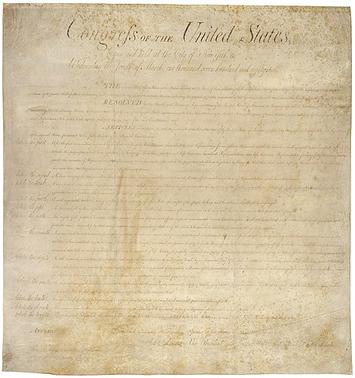
The Declaration of Independence, Constitution, and Bill of Rights have always been aspirational. When Jefferson wrote the Declaration of Independence, it was hardly self-evident that “all men were created equal.” It took almost a century before the 14th Amendment promised “equal protection under law,” and another century before could be seen as anything but a cruel hoax.
Yet these founding documents inspired abolitionists to battle slavery, women to fight for the right to vote, workers to build unions, and the heroes of the struggle for civil rights to persevere in the face of pervasive racism.
Today, many working-class Americans have lost faith in the promises of those documents. And why wouldn’t they when George Floyd could be executed over a $20 bill while the Sackler family walked away with billions after committing the crime of the century. With 85% of the nation’s wealth concentrated in the hands of the top 10% of Americans, many believe that the opportunity to “secure the blessings of liberty” for themselves and future generations is quickly slipping away, perhaps forever. Instead of looking forward to the “more perfect union” envisioned by the Constitution, working-class Americans doubt their country’s ability to “establish justice and insure domestic tranquility.”
That doubt has created anxiety among working- and middle-class families. Worse, NAFTA-loving, corporatist Democrats barely acknowledged and failed to address that erosion of belief. Donald Trump filled that vacuum with disingenuous populism, promises of a return to an America that was great mostly for white men, and hate-filled rhetoric that blamed the country’s ills on the poor, minorities, and immigrants. And a surprising number of Americans were eager to drink his toxic brew.
While the Democratic Party has yet to distill an antidote to Trump’s loathsome elixir, we believe its key ingredient must be a comprehensive set of policy initiatives to address income inequality, home ownership, the judicial system, the electoral process, and quality of life issues – a “Working-Class Bill of Rights” that could help secure the “blessings of liberty” for working-class families now and in the future.
The right to organize
Union membership has long been recognized as the path to prosperity and security for working men and women. But as the recent failed attempt to organize an Amazon facility in Alabama illustrates, laws governing union organizing in the U.S. are long overdue for reform. Along with the PRO Act recently passed by the U.S. House, Congress should enact laws that mandate card check recognition in organizing drives and ban the use of scabs and permanent replacement workers.
The right to earn a living wage
As David Leonhardt bluntly put it in a recent New York Times commentary, “worker compensation is lower than at any point in the second half of the 20th century.” Only the affluent have seen their incomes increase significantly in recent decades. Increasing unionization is one way to raise wages, but raising the minimum wage to $15 per hour and indexing it to inflation is the quickest and most effective way to make work pay in the United States. According to the Economic Policy Institute, raising the minimum wage would increase the pay of 32 million workers, generate $107 billion in higher wages, and strengthen businesses, communities, and the overall economy.
The right to equal justice under the law
In the U.S, business executives, billionaires and police officers are held to one standard of criminal culpability and members of the working-class to another. Corporate criminals and public officials, including police officers, should be prosecuted with the same enthusiasm as working-class shoplifters. Wealthy individuals and corporate CEOs who break the law should face the same consequences as criminals who don’t happen to be rich.
The right to free legal representation in civil proceedings
Equal justice requires fair representation. The Sixth Amendment guarantees the assistance of counsel for the accused in all criminal prosecutions, though the right to free legal representation in criminal proceedings was not established until 1963. In that Supreme Court decision Justice Hugo Black wrote that “[L]awyers in criminal courts are necessities, not luxuries.” We believe the same holds true for our civil courts.
Read the rest of this piece at Working-Class Perspectives.
Marc Dann served as Attorney General of the State of Ohio and now leads DannLaw, which specializes in protecting consumers from various forms of predatory financing. Leo Jennings III is a leading Northeast Ohio political consultant and media specialist.
Photo: U.S. National Archives via Flickr, in Public Domain












